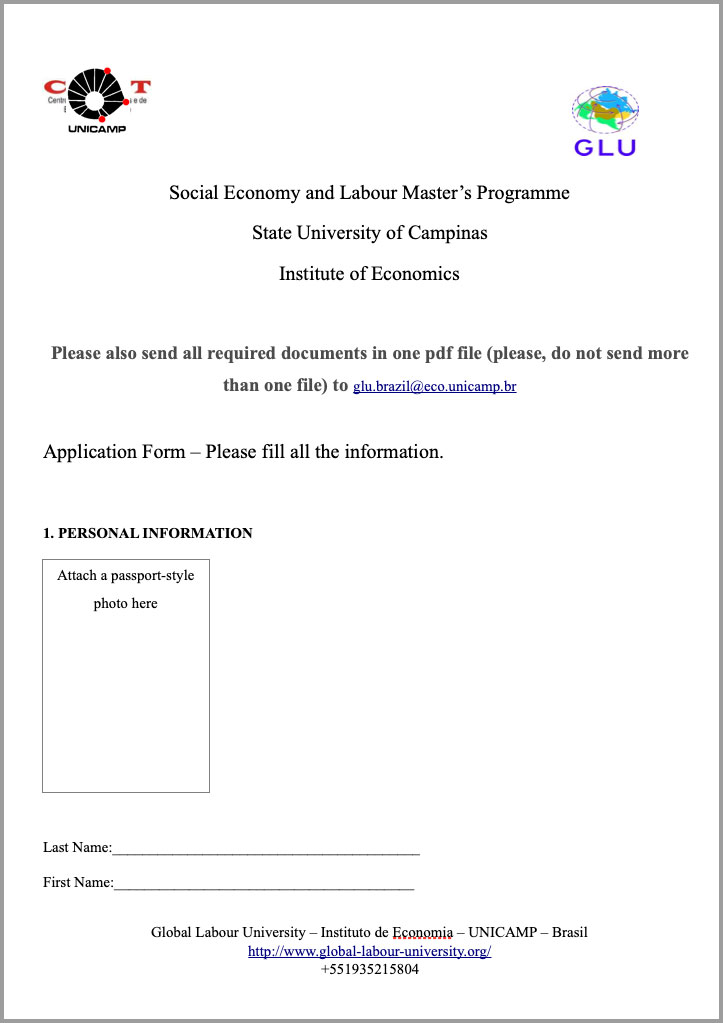Application form
Here you can find the application form
The University of Campinas (UNICAMP) and the Institute of Economics have been partners of the Global Labour University (GLU) since 2003, through the Centre for Labour Economics and Trade Unionism (CESIT).
The next step in this partnership was the implementation of the GLU Master's course "Social Economy and Labour" at UNICAMP in the state of São Paulo, Brazil. Using a comparative perspective, this course focuses on economic development, inequality, poverty, strategies of trade unionism and multinational corporations and labour.
It is taught by professors of the Institute of Economics and guest lecturers from other Brazilian universities and research institutes, as well as from the GLU partner universities.
Below you can find the basic information about this Master's programme.
Note that the application deadline for 2023-2024 is closed (was October 31, 2023).
The Master’s programme will enable participants to assist workers and their organizations to challenge the current global context and engage more effectively in social dialogue, public debate and policy implementation. This includes economic development, macroeconomics, employment creation, strategies of multinational companies, inequality, poverty, social structure, gender equality, workers’ rights, social justice, labour relations, labour regulation and trade unionism perspectives, which are vital to enhancing labour movement capacities.
The Master’s Programme is offered by the UNICAMP, Institute of Economics, in the city of Campinas, São Paulo State, Brazil. The course starts in March and is taught in English. This is an 18-month programme, and students will be required to attend the lectures from March until December and defend their Master’s thesis by August next year.
The expected number of international students is 6 to 10, with the rest of the class comprising Brazilian students and students already taking GLU Masters courses in Germany, South Africa or India. Brazilian students accepted into the programme will be encouraged to do their internship abroad.
The GLU and its Brazilian partners will provide scholarships compatible with an 18-month scholarship (about R$2000,00) per month for students to cover housing, food, and other expenses. Presently, we can´t support students with flights and other traveling expenses.
International students will have access to the state public health system, which covers regular medical consultations and emergency cases. The additional cost of internships should be covered by one extra scholarship, a special grant, or the host institutions. UNICAMP provides library facilities, study rooms and access to computers, the internet and databases. A local restaurant with subsidized prices is also available on campus.
The course is taught by professors of the Institute of Economics, with guest lecturers from other Brazilian universities and from the GLU partners.
The students need to complete 36 credits in 9 subjects. They will also be required to write a Master’s dissertation.
1st Semester (March to June):
Unicamp regularly offers an introductory Portuguese course, and attending it is strongly recommended.
In July, students should participate in a four-week internship in a trade union, a labour confederation, a research institute or another institution related to their studies in Brazil.
2nd Semester (August to December):
The call for applications is currently closed (the deadline is October 31, 2023).
01 Application Form: You can download the form below.
01 Curriculum Vitae (CV): Please provide a Curriculum Vitae (CV) that makes special reference to your practical experience in trade union work and other civil society activities on social and economic issues, current employment situation and future engagement with the labour movement. You may write any information you would like to be considered in the application process.
01 Statement of Objectives: Please write here any information which you would like to be considered in support of your application. For example, what do you hope to achieve by taking the Master’s Programme, and what effect might it have on your job aspirations and trade union activities, what work experience and skills have you acquired which are related to your programme of study?
Research Topic(s): Please provide a short type-written statement (2 pages) about a specific research topic you are interested in and the main questions about this topic that you would like to explore in more detail during the course.
Trade Union Experience – 01 Letter of Recommendation: Please provide a statement from a trade union or other membership-based organisation certifying your trade union or other civil society engagement. The letter should include a statement of whether the organisation supports your application.
Copies of documents – bachelor’s degree, transcript of examination results, Birth Certificate, Passport (pages with passport number and photo), English language proficiency certificate.
Please send the required documents (a single PDF file) to glubr@unicamp.br.
The Programme Coordinator will send an invitation letter to the candidate that should be used to request a student visa at the local Brazilian Embassy.
The following documents should also be certified (“stamped”) by the Embassy:
Unicamp will require them upon enrolment. Such documents must be translated into Portuguese by an official translator, either in the candidate’s home country or Brazil. The candidate should cover the cost.

A limited number of scholarships will be awarded to students.
If the candidate is approved and awarded a scholarship, it will cover:
Expressions of interest for a scholarship should be mentioned in the application form.
To learn more about the university's history, campus, etc.
UNICAMP has a special office for support foreign students. Visit this link to explore more
Visit this link to learn more about the institute
Further information on the CESIT
For additional information please contact our programme coordinator:
To learn more about the study programme and experiences please contact our alumni: